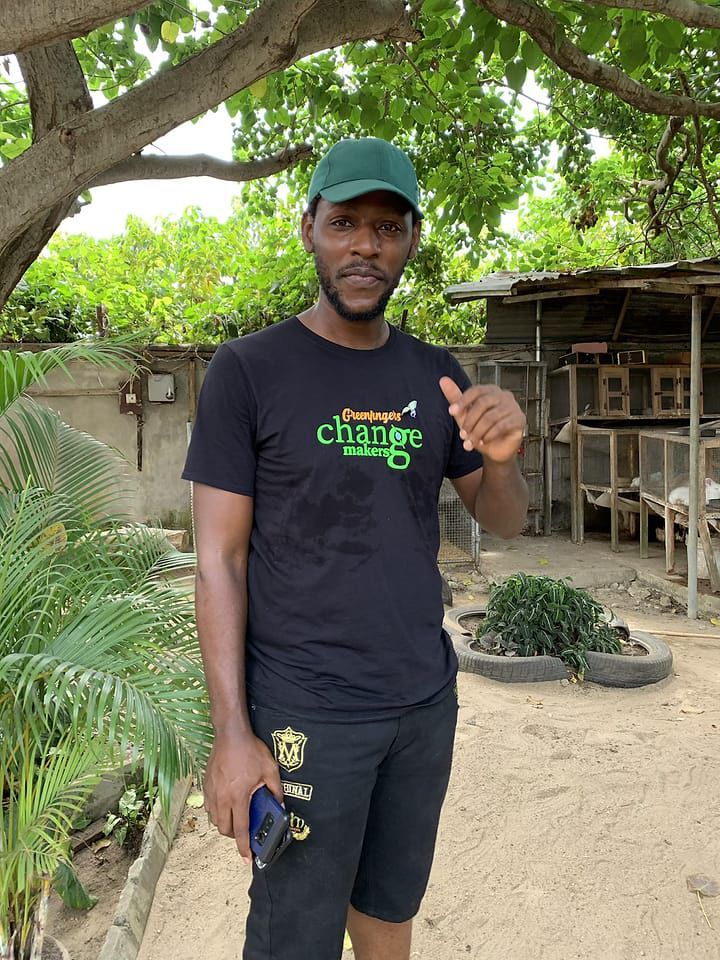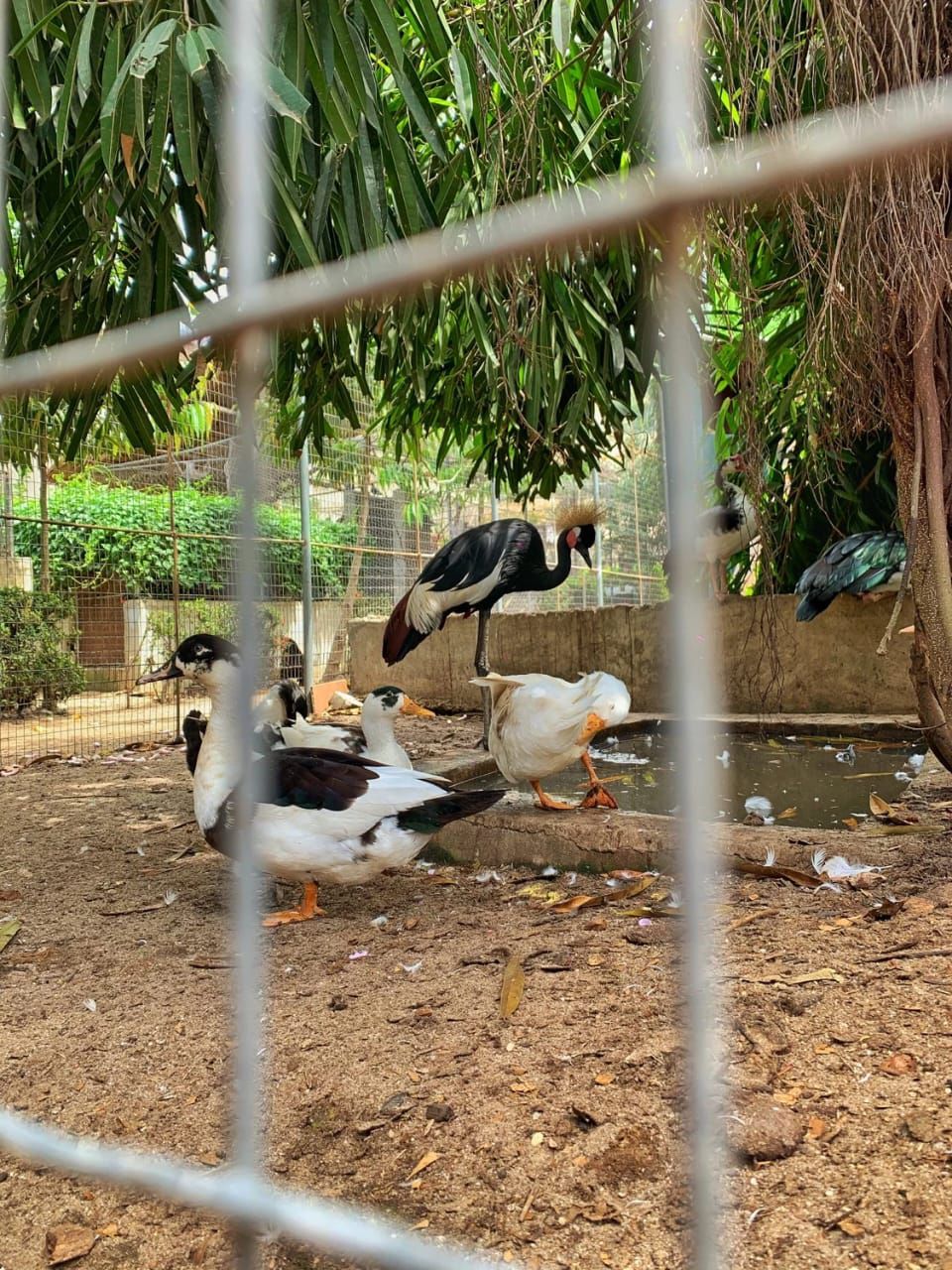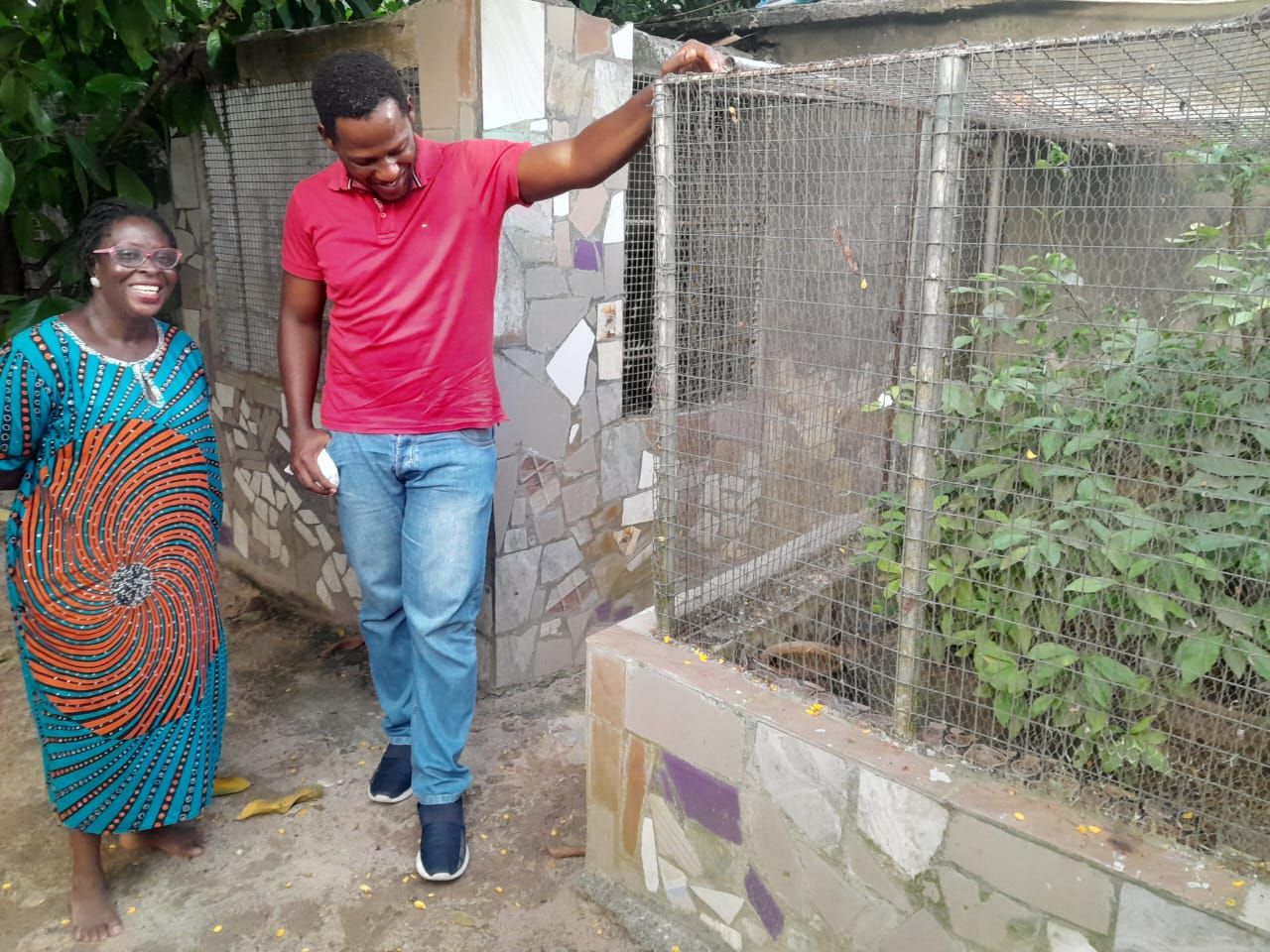By JOSFYN UBA
Chinedu Mogbo is a Nigerian wildlife conservationist who abandoned his medical practice to start a project where he rescues and rehabilitates the country’s endangered species.

After his First degree in biomedical science, Masters in public health, he worked for a while and returned to Nigeria after his father’s death and took up a teaching job at Lekki community. To pursue his passion for care of animals, he found an unoccupied piece of land nearby the school and asked the owners to allow him use it to keep some animals that he could teach his students. Eleven years after, his Greenfingers Wildlife Conservation Initiative which started in a small section has grown to house exotic species of animals like monkeys, foxes, cats, honey badgers, porcupines, horses, goldfishes, geese, eagles and peacocks, vultures and ostriches, different sizes of pythons plus vipers, and many more.

Greenfingers Garden opens your eyes to the beauty of nature with its paradise garden ambience. The centre has a wide array of animals surrounded by assorted greeneries and flowering bushes.
The garden aside playing a crucial role of promoting sustainable practices for the protection of our planet’s rich and varied life forms, is also a nature’s sanctuary that shields you from the noise and pollution being experienced in the fast-paced lifestyle of staying in a megacity.
Chinedu’s efforts are fast yielding fruits. The highlights of his efforts lie in rescuing animals caught by hunters and poachers or are being sold in the open bush meat market. He watches them grow after rehabilitation.

The risk factors are enormous because not only is he fighting for the lives of the animals but fighting local peoples’ traditions, beliefs and trying to stop their sense of “daily bread”. He is also fighting for what the government doesn’t care about, making him vulnerable and bearing the risk alone.
In a recent chat with our reporter, Chinedu Mogbo, says that Nigerian government unwillingness to implement trafficking laws portend as much danger to biodiversity as human lives.
What’s your reaction on how social media fuels the sale of bush meat from Africa to Europe?
We have begun to see animals that are in high demand by those in other countries and it’s about profit. They know that it’s a fruitful venture. They can deplete a whole forest just to enrich themselves. This is what is happening to African grey parrots which are sold for thousands of dollars in other countries but for paltry sum, here. People benefit from that the trade. Pangolins are being sold for millions of dollars. It’s the same thing for every other kind of animal. There’s a lot that driving the trade online. Government doesn’t want to target these people and ban these things from their side as they are still happening, especially locally. Our laws are weak and don’t protect the animals as much as they say they do. Authorities are not willing to enforce it.
Give me a sense of some of the animals going extinct and why is it important for you to rescue them?
When I started this wildlife work, I didn’t know much about the animals we have in Nigeria. And I have taught the highest level of secondary school to only discover that even our textbooks cannot explain the kinds of animals we had so there is a gap missing. I started working with the animals that we saw around. Over the years, I was no longer seeing the animals I used to see at certain points. They were reducing in numbers. One of those animals is pangolins. When I started, I didn’t know what the pangolins were. I just used to see them and the place where I used to see them was actually where they were sold for food. There, you would see huge piles of pangolins packed for people to buy. We focused on the ones that we knew about; the crocodiles, the dicers and snakes because the snakes, too, were part of threatened species. Some birds that are endangered in Nigeria are the vultures, and a few others. About seven to eight years down the line, the pangolins became more reduced.
What year was that?
This was 2019. Then, the news started coming out about the whole pangolin trafficking within our ports. We decided to focus more. We learnt about them and started working with them but we couldn’t work with the adults because they were always in a very bad state. When they have been captured, its either they have been shot or wounded. Now, we rescue the babies and raise them until they fit enough to go into the wild.
Why do you think it is important for authorities to take action and if they fail, what happens ultimately?
I won’t say Nigeria is part of Africa because Africa is well known for it’s biodiversity. We have the rich forest within the middle belt, within the Congo, even all the way to the North, to the Sahel. Every part of Africa is rich in a unique biodiversity. Look at other countries and see how much they value their wildlife but you see that this problem lingers in Africa.
What do you think is responsible for this?
As a wildlife conservationist, what were your expectations from COP28?
I didn’t actually expect anything. I expected the usual. When I hear about COP27, COP28, I don’t even raise expectations to things like this. I believe in results and what I am able to see. I believe in what’s happening right now. The promises have been made since 1960. I have heard it from the time of Buhari and his predecessors that in the next 10 years Nigeria is going to do this. Emissions will be cut down. It doesn’t amount to anything. Now, the conference is over, everybody is getting ready for the next one. Who is sponsoring again? Who will go? I just do what I can in my own space with my time.
Let’s look at the climate change act in Nigeria which says companies would have to cut down their carbon emission, pay carbon taxes, create awareness and mitigate some of the damages caused by their companies. What is your view?
By now, I think we should have done more than we are doing. Even when this new administration came and the president talked about climate change and that we should be paid by them but I think there is a whole lot of mystery surrounding this climate change thing within the Nigerian political space. They are lots of figure heads who are doing good job but I don’t think their voices are heard as much as in other areas. We have people in biodiversity that are supposed to handle the environment and those in wildlife but maybe, the customs are the ones enacting seizures and dealing with wildlife traffickers. So, what are the other wildlife aspects and departments doing? Traditional markets are thriving in endangered species sales in every part of the country. People along the borders are bringing animals, in and out. What is happening? So, when they came up with whole climate act, I see it just business as usual. As I speak to you now, our educational curriculum isn’t changed. It’s as backward as it was 10 years ago. And if we do not begin to target these young people and they grow up with this mentality, how are we going to tell a different story? Government needs to do more and we must hold them accountable.
Can you tell how you came into conservation of wildlife?
I think we are being driven now by other things than a sense of community development. We are only interested in what we can eat now. We don’t think about the future generations. It’s getting to a point where you would go into a place in Africa and all you would see is an over populated community with people just going about regular life without any care about the future. And unfortunately, that kind of system doesn’t last. That’s why you see everybody that goes into politics grab as much as he can eat now, spend lavishly but there is no future for the country. Lack of sustainability plan is our problem. If the stakeholders and government do not do what they are supposed to do, our biodiversity is in grave danger. You might not reap it but you will be worried when you know that your child’s life expectancy would be shorter because of your actions or inactions.
I am a teacher by profession. I was teaching in a school and there was a land space that wasn’t in use so I approached them and asked if I could use it and keep some animals there to teach the children. Then, I started in a very small section here. Over time, it’s grown to what it is today, which wasn’t the plan initially. Few years after, we had to make it an NGO because there was more meaning to it. The reason for doing it became clearer so we formed Greenfingers Wildlife Initiative. So far, it is not a big NGO as many people would expect. It is still just a small team of people whose primary focus is the care of these animals, then education.
You mentioned that vultures are some of the extinct animals in this part of the world?
Yes, they are really getting extinct. If I must say they are extirpated. It means that from every city that the vultures were, you no longer find them anymore. It is so because vultures are being used for traditional medicine practice. I once visited one of the traditional herbalists. We had an interview where we asked why vultures are reducing. He said that the use of vultures is one of the most potent rituals they perform for quick riches. All you need do is a whole vulture in dried form while for other smaller rituals, you would bring the head, the legs or the wings or other parts. That means the markets are littered with bodies of vultures. You would see Starks of dried vultures in the market because someone knows that they can use it for rituals and make money out of it. On the other hand, what is happening? There is spread of diseases. Cholera is spreading in many parts of Nigeria. Things that weren’t there before are coming on. Carcasses that die now in the forest are left out to decay. There is nothing there to clean it up like the vultures would naturally do.
This means that our biodiversity will suffer?
No. We are the ones going to suffer it because people who are dying now of cholera are not the animals. It’s the humans because the things which the vultures would naturally, have consumed and taken out of circulation are now entering our water channels, finding their way to our food. They are getting into places where they shouldn’t have been in the first place. If the system which consists of producer, consumer, decomposer were all playing their roles, it wouldn’t be so but we take off one because its sales is profitable. Some rich men, too, would want to want to wear the lion skin hats. They are being killed for these purposes. All the green life is being wiped off this way. Termites now occupy people’s homes which shouldn’t be. The farmers are complaining, pouring chemicals on tubers of yam because termites are eating them up. Subsequently, we eat and inject those chemicals into our system. The hospitals are now full of patients with cancer, different kinds of diseases that you would wonder why the increase. These are the consequences of what we have done to ourselves.
You have been in animal rescue and justice for 11 years. Can you tell us some of your experiences?
It’s one of the most risky ventures to go into because you are not only fighting for the lives of the animals. You are fighting people’s traditions, beliefs and sense of “illegal daily bread”. You are fighting for something the government doesn’t care about so it practically makes you vulnerable and so much at risk. You are a lone ranger, more or less. We have been placed in many positions where we knew that it would take the grace of God to come out of it alive just because of an animal. We are still doing what we love to do and we are also grateful for the opportunities, privileges and the experiences. It’s one of the most difficult things but it’s worth the while, for me.
What were the challenges, initially?
I think stubbornness has been my positive trait and my sense of peace. I have lost a lot of friends and declined a lot of social engagements. I have had my fair share of disappointment. I never regretted it because when I look back now, I saw those things as mere distractions. I don’t even know whether it’s a calling but I just feel moved to walk this path. For those who care to join me are there to stay and those who felt otherwise, I don’t begrudge them. I don’t know why it happened this way but I am forever focused on it. I am daily motivated anytime I come in here. There is always something different. It wasn’t like these three or two years ago. We don’t stop. We have to keep moving and ensuring that we are progressing. Our goal is how we can help these animals even further. My driving force is to see that the animals are well kept.




